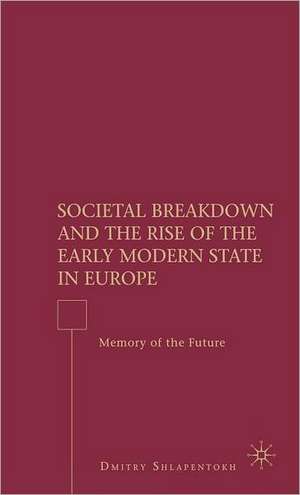Societal Breakdown and the Rise of the Early Modern State in Europe: Memory of the Future
Autor D. Shlapentokhen Limba Engleză Hardback – 9 apr 2008
| Toate formatele și edițiile | Preț | Express |
|---|---|---|
| Paperback (1) | 382.36 lei 6-8 săpt. | |
| Palgrave Macmillan US – 9 oct 2015 | 382.36 lei 6-8 săpt. | |
| Hardback (1) | 386.22 lei 6-8 săpt. | |
| Palgrave Macmillan US – 9 apr 2008 | 386.22 lei 6-8 săpt. |
Preț: 386.22 lei
Nou
Puncte Express: 579
Preț estimativ în valută:
73.91€ • 76.66$ • 61.63£
73.91€ • 76.66$ • 61.63£
Carte tipărită la comandă
Livrare economică 27 martie-10 aprilie
Preluare comenzi: 021 569.72.76
Specificații
ISBN-13: 9780230603752
ISBN-10: 0230603750
Pagini: 233
Ilustrații: V, 233 p.
Dimensiuni: 140 x 216 x 18 mm
Greutate: 0.37 kg
Ediția:2008
Editura: Palgrave Macmillan US
Colecția Palgrave Macmillan
Locul publicării:New York, United States
ISBN-10: 0230603750
Pagini: 233
Ilustrații: V, 233 p.
Dimensiuni: 140 x 216 x 18 mm
Greutate: 0.37 kg
Ediția:2008
Editura: Palgrave Macmillan US
Colecția Palgrave Macmillan
Locul publicării:New York, United States
Cuprins
Revolution as Disintegration, Meltdown and the Rise of the Strong State: Major Theorists and Framework of the Work * Background to the Early Modern Era * Crime in France in the Fourteenth and Fifteenth Centuries * Medical Implications: Asocial Process and Disease * Persistent Danger: Asocial Behavior in the Sixteenth Century * Conclusion: The Rise of the Despotic Government
Recenzii
"Dmitry Shlapentokh's deliciously Hobbesian tour de force effectively challenges reigning views of the modern state as the product of ideology, discourse, rational choice, contingency, and institutional utility. And by taking crime, banditry, and violence seriously, Shlapentokh persuasively argues that societal disintegration gave rise to the 'strong repressive state,' which in turn enabled civil society and democracy to emerge. Everyone with a theory of the state should read this book." - Alexander J. Motyl, Professor of Political Science, Rutgers University - Newark
"This book examines the link between social disorder, revolution, totalitarianism, and restoration of 'the basic order.' Shalpentokh locates his historical causes not in socio-political conflicts, but rather in the associated behaviors that confront order itself. Shlapentokh asks the question: is post-totalitarianism to be our future? This is a provocative thesis and a challenge to the historicity of events, with political implications. This book promises controversy." - Claudio Sergio Nun Ingerflom, Director of Research, Centre National de Recherches Scientifiques, France
"This book examines the link between social disorder, revolution, totalitarianism, and restoration of 'the basic order.' Shalpentokh locates his historical causes not in socio-political conflicts, but rather in the associated behaviors that confront order itself. Shlapentokh asks the question: is post-totalitarianism to be our future? This is a provocative thesis and a challenge to the historicity of events, with political implications. This book promises controversy." - Claudio Sergio Nun Ingerflom, Director of Research, Centre National de Recherches Scientifiques, France
Notă biografică
Dmitry Shlapentokh is Associate Professor of History, Indiana University South Bend.
















